|
|
|
Sort Order |
|
|
|
Items / Page
|
|
|
|
|
|
|
| Srl | Item |
| 1 |
ID:
152021
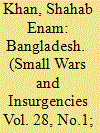

|
|
|
|
|
| Summary/Abstract |
Bangladesh is currently facing an incremental growth of radicalization. This radicalization can be traced back to the country’s early post-Independence years. Over time, political violence, ideological clashes between secular and right-wing ideologies, and weak governance have created conditions for the growth of radical Islam. The public rhetoric on corruption, weakening of democratic institutions, inadequate law enforcement agencies, fragile justice delivery system, fledgling educational and social institutions and growing unemployment provides further space for alternative narratives by extremist ideologues. Home-grown extremist outfits have received ideological and tactical supports from transnational terrorist network such as Islamic State (IS) and Al-Qaeda in Indian Subcontinent (AQIS), but only in a limited manner. The supply and demand side of radicalization in Bangladesh has not yet been addressed by actors such as the government, private sector, civil society and media. The failures in multiple sectors in the state governance have led to a situation where IS and AQIS now see Bangladesh as a potential ground for exerting their supremacy as flag bearers of radical forms of Islam.
|
|
|
|
|
|
|
|
|
|
|
|
|
|
|
|
| 2 |
ID:
191892
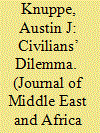

|
|
|
|
|
| Summary/Abstract |
How did Iraq’s ethnic and religious minorities survive the Islamic State (ad-Dawlah al-Islāmiyah, IS) occupation of Ninewa Governorate? Existing accounts of wartime survival either essentialize social identity or ignore it altogether by reducing survival to cost-benefit calculations or political opportunism. Against the conventional wisdom, this article argues that individuals survive conflict by drawing on repertoires – consisting of practices, tools, organized routines, symbols, and rhetorical strategies – to navigate violent situations. Distinct from deliberate calculations or rational strategies, repertoires are creative, flexible, and often contradictory. The author examines Iraqis’ reliance on survival repertoires through a mixed-methods research design of observational data and fieldwork. This study begins by analyzing migration patterns recorded in the United Nation’s Displacement Tracking Matrix. To understand how Iraqis who remained survived the conflict, this work draws on original interviews with Iraqi peacebuilders from minority communities. While most minorities fled during the IS offensive of June 2014, those who remained pursued various forms of cooperation, contention, and neutrality. This research finds that those who remained survived the conflict by mobilizing self-defense groups and by their coordination with members of the anti-IS coalition. Opportunistic collaboration with IS insurgents during the initial stages of the occupation was less common. In areas where the Iraqi Security Forces (al-Quwāt al-Maslahah al-ʿIrāqiyya, ISF) or Peshmerga were absent, residents mobilized community militias unaligned from Baghdād or Arbīl. The findings of this research provide insights for scholars and practitioners interested in peacebuilding, transitional justice, and post-conflict reconstruction in fragile states.
|
|
|
|
|
|
|
|
|
|
|
|
|
|
|
|
| 3 |
ID:
172187
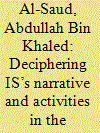

|
|
|
|
|
| Summary/Abstract |
The self-proclaimed Islamic State (IS) has never ceased targeting, verbally and physically, the Kingdom of Saudi Arabia. While it might be easy to know why, it is harder, but more important, to understand how. Since Abu Bakr al-Baghdadi proclaimed the establishment of a wilaya (province) in the land of the two Holy Mosques in November 2014, thirty-two IS-linked terrorist operations took place in Saudi Arabia. Based on primary source materials produced by IS, and an examination of its footprint in Saudi Arabia, this article explains the calculus behind IS’s strategy and objectives in Saudi, shows the main themes of its narrative and how it tailors its strategic communications campaign to the specific historical and social context of the country, and illustrates how it tries to exploit and claim the Saudi religious heritage. The article also examines to what extent IS’s activities and operations reflect its rhetoric and purported strategy, describes the structure it adopts inside the Kingdom, and demonstrates why the momentum of its violent campaign has faltered in recent months.
|
|
|
|
|
|
|
|
|
|
|
|
|
|
|
|
| 4 |
ID:
167756
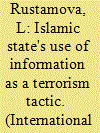

|
|
|
|
|
| Summary/Abstract |
ISLAMIC STATE (IS, an organization banned in Russia and also known as the Islamic State of Iraq and Syria or ISIS and the Islamic State of Iraq and the Levant or ISIL) became an actor in world politics quite recently but showed its nature as a threat to international peace and security as soon as it came onto the global political scene. Some scholars, among them Jessica Stern, J.M. Berger,1 Georgy Mirsky,2 Stephen Walt,3 and Alexey Volynets,4 see IS as a state-like entity because it does possess (although the past tense would be more appropriate) basic characteristics of a state - it controls a populated territory, has a government system similar to that of any modern state, and maintains relations of some kind with other states.
|
|
|
|
|
|
|
|
|
|
|
|
|
|
|
|
| 5 |
ID:
143725
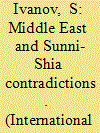

|
|
|
|
|
| Summary/Abstract |
For many centuries, the Middle East or, rather what has been going on there, echoed far and wide in the neighboring regions, Europe in the first place. Today, however, the threats achieved the dimensions unheard of before; they range from the inflow of refugees and the resultant migration crisis in Europe, a potential threat to its cultural and ethnic identity, to terrorism and radical Islam exported all over the world to threaten stability and security elsewhere.
|
|
|
|
|
|
|
|
|
|
|
|
|
|
|
|
| 6 |
ID:
153096
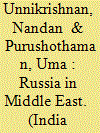

|
|
|
|
|
| Summary/Abstract |
Russia has re-emerged as a major player in the Middle East once again, mainly because of its military intervention in the Syrian civil war in September 2015. This article throws light on Russia’s civilizational links with the region and what its aims in the region have been over the years, including the during Cold War. While Russia’s foreign policy towards the Middle East was passive in the tumultuous years following the fall of the Soviet Union, over the last few years, it has begun reorienting and recalibrating its policy towards the region. This article discusses Russia’s current aims in the region and its global ambitions, linking these to its intervention in the Syrian civil war, paying particular attention to the close ties that Russia has with Syria. This article attempts to explore whether Russia’s presence in the region is sustainable. It also explains the consequences of Russia’s intervention for the region and for Russia itself.
|
|
|
|
|
|
|
|
|
|
|
|
|
|
|
|
|
|
|
|
|